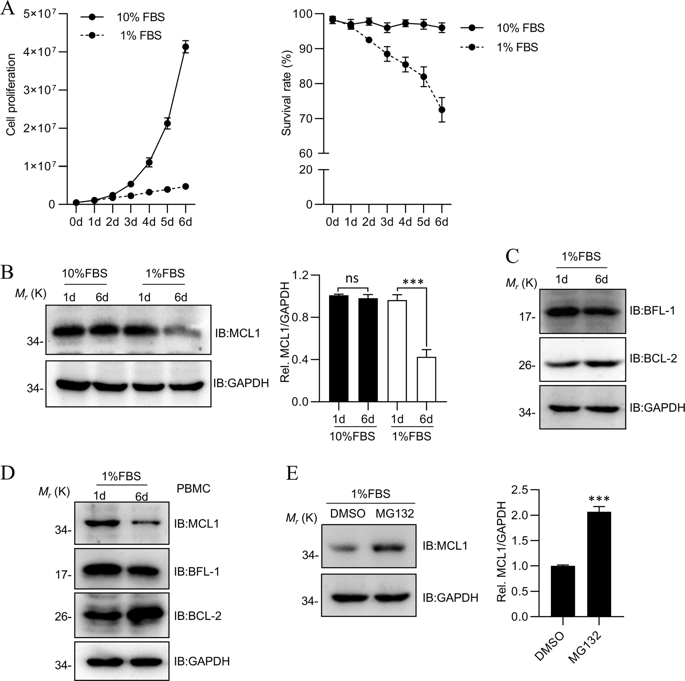当前位置:
X-MOL 学术
›
Cell Death Dis.
›
论文详情
Our official English website, www.x-mol.net, welcomes your
feedback! (Note: you will need to create a separate account there.)
ALG-2 couples T cell activation and apoptosis by regulating proteasome activity and influencing MCL1 stability.
Cell Death & Disease ( IF 8.1 ) Pub Date : 2020-01-02 , DOI: 10.1038/s41419-019-2199-4 Tian-Sheng He 1 , Wangsheng Ji 1 , Junqi Zhang 1 , Jing Lu 1 , Xinqi Liu 1
Cell Death & Disease ( IF 8.1 ) Pub Date : 2020-01-02 , DOI: 10.1038/s41419-019-2199-4 Tian-Sheng He 1 , Wangsheng Ji 1 , Junqi Zhang 1 , Jing Lu 1 , Xinqi Liu 1
Affiliation

|
T cell homeostasis is critical for the proper function of the immune system. Following the sharp expansion upon pathogen infection, most T cells die in order to keep balance in the immune system, a process which is controlled by death receptors during the early phase and Bcl-2 proteins in the later phase. It is still highly debated whether the apoptosis of T cells is determined from the beginning, upon activation, or determined later during the contraction. MCL1, a Bcl-2 family member, plays a pivotal role in T cell survival. As a fast turnover protein, MCL1 levels are tightly regulated by the 26S proteasome-controlled protein degradation process. In searching for regulatory factors involved in the actions of MCL1 during T cell apoptosis, we found that ALG-2 was critical for MCL1 stability, a process mediated by a direct interaction between ALG-2 and Rpn3, a key component of the 26S proteasome. As a critical calcium sensor, ALG-2 regulated the activity of the 26S proteasome upon increases to cytosolic calcium levels following T cell activation, this consequently influenced the stability of MCL1 and accelerated the T cell "death" process, leading to T cell contraction and restoration of immune homeostasis. Our study provides support for the notion that T cells are destined for apoptosis after activation, and echoes the previous study about the function of ALG-2 in T cell death.
中文翻译:

ALG-2通过调节蛋白酶体活性和影响MCL1稳定性来偶联T细胞活化和凋亡。
T细胞稳态对于免疫系统的正常功能至关重要。在病原体感染后急剧扩增后,大多数T细胞死亡以保持免疫系统平衡,这一过程由早期的死亡受体和后期的Bcl-2蛋白控制。T细胞的凋亡是从一开始就确定,在激活时是确定的,还是在收缩过程中是后来确定的,仍然是一个有争议的问题。MCL1,Bcl-2家族成员,在T细胞存活中起关键作用。作为快速更新的蛋白质,MCL1的水平受到26S蛋白酶体控制的蛋白质降解过程的严格调控。在寻找参与T细胞凋亡期间MCL1作用的调节因子时,我们发现ALG-2对于MCL1稳定性至关重要,由ALG-2和Rpn3(26S蛋白酶体的关键成分)之间的直接相互作用介导的过程。作为关键的钙传感器,ALG-2在T细胞活化后增加至胞浆钙水平时调节26S蛋白酶体的活性,因此影响MCL1的稳定性并加速T细胞“死亡”过程,从而导致T细胞收缩和恢复免疫稳态。我们的研究为T细胞活化后注定会凋亡的观点提供了支持,并与先前有关ALG-2在T细胞死亡中的功能的研究相呼应。因此,这影响了MCL1的稳定性并加速了T细胞“死亡”过程,从而导致T细胞收缩和免疫稳态的恢复。我们的研究为T细胞活化后注定会凋亡的观点提供了支持,并与先前有关ALG-2在T细胞死亡中的功能的研究相呼应。因此,这影响了MCL1的稳定性并加速了T细胞“死亡”过程,从而导致T细胞收缩和免疫稳态的恢复。我们的研究为T细胞活化后注定会凋亡的观点提供了支持,并与先前有关ALG-2在T细胞死亡中的功能的研究相呼应。
更新日期:2020-01-09
中文翻译:

ALG-2通过调节蛋白酶体活性和影响MCL1稳定性来偶联T细胞活化和凋亡。
T细胞稳态对于免疫系统的正常功能至关重要。在病原体感染后急剧扩增后,大多数T细胞死亡以保持免疫系统平衡,这一过程由早期的死亡受体和后期的Bcl-2蛋白控制。T细胞的凋亡是从一开始就确定,在激活时是确定的,还是在收缩过程中是后来确定的,仍然是一个有争议的问题。MCL1,Bcl-2家族成员,在T细胞存活中起关键作用。作为快速更新的蛋白质,MCL1的水平受到26S蛋白酶体控制的蛋白质降解过程的严格调控。在寻找参与T细胞凋亡期间MCL1作用的调节因子时,我们发现ALG-2对于MCL1稳定性至关重要,由ALG-2和Rpn3(26S蛋白酶体的关键成分)之间的直接相互作用介导的过程。作为关键的钙传感器,ALG-2在T细胞活化后增加至胞浆钙水平时调节26S蛋白酶体的活性,因此影响MCL1的稳定性并加速T细胞“死亡”过程,从而导致T细胞收缩和恢复免疫稳态。我们的研究为T细胞活化后注定会凋亡的观点提供了支持,并与先前有关ALG-2在T细胞死亡中的功能的研究相呼应。因此,这影响了MCL1的稳定性并加速了T细胞“死亡”过程,从而导致T细胞收缩和免疫稳态的恢复。我们的研究为T细胞活化后注定会凋亡的观点提供了支持,并与先前有关ALG-2在T细胞死亡中的功能的研究相呼应。因此,这影响了MCL1的稳定性并加速了T细胞“死亡”过程,从而导致T细胞收缩和免疫稳态的恢复。我们的研究为T细胞活化后注定会凋亡的观点提供了支持,并与先前有关ALG-2在T细胞死亡中的功能的研究相呼应。











































 京公网安备 11010802027423号
京公网安备 11010802027423号